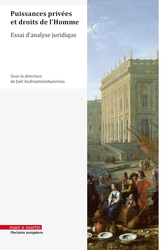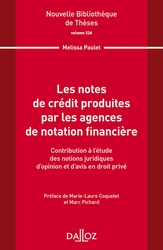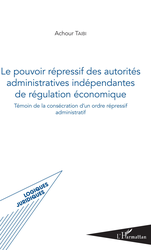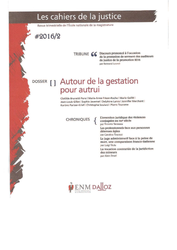Publications

🌐follow Marie-Anne Frison-Roche on LinkedIn
🌐subscribe to the Newsletter MAFR Regulation, Compliance, Law
____
► Full Reference: M.-A. Frison-Roche, "Concevoir l'Obligation de Compliance : faire usage de sa position pour participer à la réalisation des Buts Monumentaux de la Compliance" ("Conceiving the Compliance Obligation: Using its Position to take part in achieving the Compliance Monumental Goals"), in M.-A. Frison-Roche (ed.), L'Obligation de Compliance, Journal of Regulation & Compliance (JoRC) and Dalloz, "Régulations & Compliance" Serie, 2024, to be published
____
📝read the article (in French)
____
🚧read the bilingual Working Paper on the basis this contribution has been built, with more developments, technical references and hyperlinks.
____
📕read a general presentation of the book, L'Obligation de Compliance, in which this article is published
____
► English summary of this contribution: Rather than getting bogged down in definitional disputes, given that Compliance Law is itself a incipient branch of Law, the idea of this contribution is to take as a starting point the different regimes of so many different compliance obligations to which laws and regulations subject large companies: sometimes they must apply them to the letter and sometimes they are only penalised in the event of fault or negligence. This brings us back to the distinction between obligations of result and obligations of means.
Although it might be risky to transpose the expression and regime of contractual obligations to legal obligations, starting from this observation in the Compliance Evidentiary System of a plurality of obligations of means and of result, depending on whether we are dealing with this or that technical compliance obligation, we must first classify them. It would appear that this plurality does not constitute a definitive obstacle to the creation of a single definition of the Compliance Obligation. On the contrary, it makes it possible to clarify the situation, to trace the paths through what is so often described as a legal jumble, an unmanageable mass of regulations.
Indeed, insofar as the company obliged under Compliance Law participates in the achievement of the Monumental Goals on which this branch of Law is normatively based, a legal obligation which may be relayed by contract or even by ethics, it can only be an obligation of means, by virtue of this very teleological nature and the scale of the goals targeted, for example the happy outcome of the climate crisis which is beginning or the desired effective equality between human beings. This established principle leaves room for the fact that the behaviour required is marked out by processes put in place by structured tools, most often legally described, for example the establishment of a vigilance plan or regularly organised training courses (effectiveness), are obligations of result, while the positive effects produced by this plan or these training courses (efficacy) are obligations of means. This is even more the case when the aim is to transform the system as a whole, i.e. to ensure that the system is solidly based, that there is a culture of equality, and that everyone respects everyone else - all of which come under the heading of efficiency.
The Compliance Obligation thus appears unified because, gradually, and whatever the various compliance obligations in question, their intensity or their sector, its structural process prerequisites are first and foremost structures to be established which the Law, through the Judge in particular, will require to be put in place but will not require anything more, whereas striving towards the achievement of the aforementioned Monumental Goals will be an obligation of means, which may seem lighter, but corresponds to an immeasurable ambition, linked with these Goals. Moreover, because these structures (warning platforms, training, audits, contracts and clauses, etc.) only have meaning in order to produce effects and behaviour leading to changes converging towards the Monumental Goals, it is the obligations of means that are most important and not the obligations of result. The judge must also take this into account.
Finally, the Compliance Obligation, which therefore consists of this interweaving of multiple compliance obligations of result and means of using the Entreprise's position, ultimately aims at system efficiency, in Europe at system civilisation, for which companies must show not so much that they have followed the processes correctly (result) but that this has produced effects that converge with the Goals sought by the legislator (effects produced according to a credible trajectory). This is how a crucial economic operator, responsible Ex Ante, should organise itself and behave.
________
Thesaurus : Doctrine

► Référence complète : M. M. Mohamed Salah, "Conclusions", in J. Andriantsimbazovina (dir.), Puissances privées et droits de l'Homme. Essai d'analyse juridique, Mare Martin, coll. "Horizons européens", 2024, pp. 297-314
____
► Résumé de l'article :
____
🦉Cet article est accessible en texte intégral pour les personnes inscrites aux enseignements de la Professeure Marie-Anne Frison-Roche
________
Thesaurus : Doctrine

► Référence complète : A. Cheng, "Il ne peut y avoir deux soleils dans le ciel, ni deux princes pour un pays » : despotisme et monisme en Chine", Cours au Collège de France, 2024.
Il s'agit de partir de la phrase de Montesquieu qui affirme que la Chine est un régime despotique dont le principe est la crainte et de la confronter à la Chine d'hier et d'aujourd'hui.
____
____
► Cours successifs :
🎥Questions de traduction (1), 14 novembre 2024
Montesquieu "a commencé par parler japonais", le Japon moderne ayant été marqué par L'esprit des lois, la notion de despotisme et la notion de séparation des pouvoirs s'introduisant par la traduction en japonais et en chinois, notions qui étaient totalement inédites, dans des cultures confucéennes. A cette aune et selon des auteurs japonais réformateurs, le Japon peut apparaître comme un espace "constitutionnel" tandis que la Chine apparaît comme un espace despotique. Un autre auteur japonais traduit en distinguant le régime monarchique, le régime aristocratique et la république. Le despote est alors celui qui règne seul et sans limite de son pouvoir, la qualification visant la dérive monarchique, mais l'auteur n'en conclut pas à la séparation des pouvoirs. Des manuels scolaires japonais s'approprient la pensée de Montesquieu et présentent la Chine comm despotique. C'est le gouvernement Meiji qui 2 ans plus tard propose la séparation des pouvoirs législatif, exécutif et judiciaire. Des conférences savantes à Tokyo se réfèrent à Montesquieu et sa théorie de la séparation de 3 pouvoirs indépendants pour éviter le despotisme mais souligne que ce sont les Etats-Unis qui seuls l'appliquent.
🎥Questions de traduction (2) 21 novembre 2024🎥La faute à Montesquieu 28 novembre 2024🎥La rupture moderniste et libérale 5 décembre 2024🎥Pensée minben (primauté du peuple) contre despotisme 12 décembre 2024🎥Réfutation de la pensée minben 19 décembre 2024🎥Ni deux soleils, ni deux princes 9 janvier 2025🎥Un seul Dao holiste et moniste 16 janvier 2025🎥Le culte du Grand Un 23 janvier 2025
_______
Thesaurus : Doctrine
Référence complète : Gautier, P.-Y. et Perché, Ch., "De l’abdication de la Loi", in En hommage à Jean Foyer, Les métamorphoses de la loi, Editions Panthéon-Assas, 2022, p.233-251.
____
April 14, 2026
Publications

🌐Follow Marie-Anne Frison-Roche on LinkedIn
🌐Subscribe to the Newsletter MAFR Regulation, Compliance, Law
🌐Subscribe to the video newsletter MAFR Overhang
🌐Subscribe to the Newsletter MaFR Law & Art
____
► Full Reference: M.-A. Frison-Roche, "Conceiving the Compliance Obligation: Using its Position to take part in achieving the Compliance Monumental Goals", in M.-A. Frison-Roche (ed.), Compliance Obligation, Journal of Regulation & Compliance (JoRC) and Bruylant, "Compliance & Regulation" Serie, 2026, forthcoming.
____
📝read the article
____
____
📘read a general presentation of the book, Compliance Obligation, in which this article is published
____
► Summary of this article: This article explains what companies' Compliance Obligation" is. Delving into the mass of compliance obligations, it uses the method of classification of those that are subject to an obligation of result and those that are subject to an obligation of means. It justifies the choice of this essential criterion, which changes the objects and the burden of proof of companies that are subject to an obligation of result when it comes to setting up "compliance structures" and are subject to an obligation of means when it comes to the effects produced by these compliance structures.
Indeed, rather than getting bogged down in definitional disputes, given that Compliance Law is itself a nascent branch of Law, the idea of this contribution is to take as a starting point the different legal regimes of so many different compliance obligations to which laws and regulations subject large companies: sometimes they have to apply them to the letter and sometimes they are only sanctioned in the event of fault or negligence. This brings us back to the distinction between obligations of result and obligations of means.
Although it would be risky to transpose the expression and regime of contractual obligations to legal obligations put by legislation, starting from this observation in the evidentiary system of compliance of a plurality of obligations of means and of result, depending on whether it is a question of this or that technical compliance obligation, we must first classify them. It would then appear that this plurality will not constitute a definitive obstacle to the constitution of a single definition of the Compliance Obligation. On the contrary, it makes it possible to clarify the situation, to trace the paths through what is so often described as a legal jumble, an unmanageable "mass of regulations".
Indeed, insofar as the company obliged under Compliance Law participates in the achievement of the Monumental Goals on which this is normatively based, a legal obligation which may be relayed by contract or even by Ethics, it can only be an obligation of means, by virtue of this very teleological nature and the scale of the goals targeted, for example the happy outcome of the climate crisis which is beginning or the desired effective equality between human beings. This established principle leaves room for the fact that the behaviour required is marked out by processes put in place by structured tools, most often legally described, for example the establishment of a vigilance plan or regularly organised training courses (effectiveness), are obligations of result, while the positive effects produced by this plan or these training courses (effaciety) are obligations of means. This is even more the case when the Goal is to transform the system as a whole, i.e. to ensure that the system is solidly based, that there is a culture of equality, and that everyone respects everyone else, all of which come under the heading of efficiency.
The Compliance Obligation thus appears unified because, gradually, and whatever the various compliance obligations in question, their intensity or their sector, its structural process prerequisites are first and foremost structures to be established which the Law, through the Judge in particular, will require to be put in place but will not require anything more, whereas striving towards the achievement of the aforementioned Monumental Goals will be an obligation of means, which may seem lighter, but corresponds to an immeasurable ambition, commensurate with these Goals. In addition, because these structures (alert mechanisms, training, audits, contracts and clauses, etc.) have real meaning if they are to produce effects and behaviours that lead to changes converging towards the Monumental Goals, it is the obligations of means that are most important and not the obligations of result. The judge must also take this into account.
Finally, the Compliance Obligation, which therefore consists of this interweaving of multiple compliance obligations of result and means of using the entreprise's position, ultimately Goals at system efficiency, in Europe at system civilisation, for which companies must show not so much that they have followed the processes correctly (result) but that this has produced effects that converge with the Goals sought by the legislator (effects produced according to a credible trajectory). This is how a crucial company, responsible Ex Ante, should organise itself and behave.
________
Nov. 12, 2025
Thesaurus : Doctrine
► Référence complète : B. Mathieu, « Contraintes et liberté du juge constitutionnel dans l'exercice de son travail d'interprétation », in Cahiers de droit constitutionnel, Les méthodes d'interprétation nov. 2025.
____
► Résumé de l'article : S'appuyant sur les décisions du Conseil constitutionnel, l'auteur montre que celui-ci ne se contraint que peu lorsqu'il s'agit de contrôler les normes constitutionnelles, notamment parce qu'il choisit les contours du bloc de constitutionnalité, mais qu'il se limite davantage lorsqu'il contrôle les normes législatives, respectant davantage la séparation des pouvoirs (puisqu'il est lui-même une juridiction).
____
________
Nov. 4, 2025
Thesaurus : Doctrine
► Référence complète : M. Cirotteau, Le pouvoir administratif des personnes privées, préf. Th. Perroud, Éd. Panthéon-Assas, coll. "Nouvelle recherche", 2025, 768 p.
____
► Résumé de l'ouvrage (fait par l'éditeur) : "Le pouvoir administratif des personnes privées n’est pas une « monstruosité » du droit administratif, mais une notion originale qui désigne la capacité des personnes morales de droit privé à prendre des actes juridiques.
Ce pouvoir se traduit par la détention de fonctions de police administrative spéciale, par des personnes privées, qui s’exerce sur les opérateurs économiques. Par opposition avec la théorie normativiste qui associe l’acte juridique à la volonté, plusieurs exemples sélectionnés dans le droit positif permettent de penser ce phénomène en s’appuyant sur la théorie du pouvoir.
L’auteure applique un régime, qui s’inspire des principes irriguant le droit administratif, au pouvoir administratif des personnes privées, et questionne son encadrement par les méthodes du contentieux administratif. Elle propose finalement d’introduire une logique concurrentielle dans les secteurs où ce pouvoir fait irruption et perturbe le fonctionnement des marchés. Ce faisant, Marie Cirotteau nous invite à repenser les conditions qui ont construit le savoir juridique, et propose des réponses inédites face aux défis posés par l’accroissement du pouvoir de certaines grandes entreprises aujourd’hui.".
________
Oct. 15, 2025
Thesaurus : Doctrine
► Référence complète : M. Cirotteau, Le pouvoir administratif des personnes privées, préf. Th. Perroud, Editions Panthéon-Assas, coll. "Nouvelles recherches", 2025, 626 p.
____
Il s'agit de la publication d'une thèse soutenue en 2022.
🕴️Lire l'entretien avec l'auteur
____
► Présentation de l'ouvrage (faite par l'auteur) : "Le pouvoir administratif des personnes privées est un pouvoir discret et relativement méconnu. Il caractérise les missions administratives spécifiques, et en particulier celles de police administrative spéciale, confiées à certaines personnes morales de droit privé. Depuis longtemps, l’administration s’est appuyée sur des personnes privées pour assurer la gestion d’activités administratives. Ce recours s’explique par l’histoire de la construction de l’État français et de son administration et par l’originalité du modèle économique français qui fait coexister libéralisme et interventionnisme. Dans la période contemporaine, il s’est accru quantitativement. À travers plusieurs exemples sélectionnés – ordres professionnels, fédérations sportives, entreprises de marché, autorité de régulation de la publicité, organismes de gestion collective des droits d’auteur, sociétés d’aménagement foncier et d’établissement rural – cette étude propose d’identifier une notion originale et autonome de pouvoir administratif des personnes privées pour penser de manière transversale les prérogatives dont sont dotées certaines personnes morales de droit privé. La recherche porte également sur le régime juridique de ce pouvoir, principalement de droit privé, qu’elle construit en s’inspirant des principes qui irriguent le droit administratif. Elle interroge ainsi les ressorts et les méthodes contentieuses, utilisés en droit administratif, ainsi que ceux du droit économique – théorie générale des obligations et droit de la concurrence – pour penser l’encadrement juridique et juridictionnel d’un pouvoir caractérisé par son hybridité.".
________
Oct. 5, 2025
Newsletter MAFR - Law, Compliance, Regulation

🌐follow Marie-Anne Frison-Roche on LinkedIn
🌐subscribe to the Newsletter MAFR Regulation, Compliance, Law
🌐subscribe to the Video Newsletter MAFR Surplomb
🌐subscribe to the Newsletter MaFR Droit & Art
____
► Full Reference: M.-A. Frison-Roche, ""Juge modeste" ou "check and balance" :alternative aux Etats-Unis, alternative en France" ("modest judge" or "check and balance": alternative in the United States, alternative in France), Newsletter MAFR Law, Compliance, Regulation, 6 October 2025..
____
📧Read by free subscription other news from the MAFR Newsletter - Law, Compliance, Regulation
____
► Summary of this article: Recent, if not forthcoming, decisions by the US Supreme Court show that the American political system that was based on the unwritten principle of Check and Balance, requiring the Justices to constitute one Power facing the other two could be replaced by a political system based on the principle of a "modest Justice" enforcing decisions made by the Federal Executive. They would then have a new Constitution.
In Western Europe and especially in France, it is possible that the letter of the Constitution, which states that judges are not an autonomous power vis-à-vis the other two powers, will be abandoned and that, in the name of an unwritten principle, the Rule of Law, its transformation into an autonomous Power facing the executive in its own right will be adopted. The path would be exactly the opposite. We would then have changed the Constitution.
That's conceivable, and there are many arguments in favour of it.
We have to say so. And draw all the consequences.
____
📧read below the article published the 6 October dans the Newsletter MAFR - Law, Compliance, Regulation ⤵️
Sept. 4, 2025
Thesaurus : Doctrine

► Full Reference: B. Frydman & A. Briegleb, "L'obligation de compliance en Droit global ("Compliance Obligation in Global Law)", in M.-A. Frison-Roche (ed.), L'Obligation de Compliance, Journal of Regulation & Compliance (JoRC) and Éditions Lefebvre - Dalloz, coll. "Régulations & Compliance", 2025, forthcoming.
____
📕read a general presentation of the book, L'Obligation de Compliance, in which this contribution is published
____
► English summary of this contribution (done by the Journal of Regulation & Compliance - JoRC): The authors stress that the Contracts Law and Tort Law are essential in Compliance Law, particularly in its global legal perspective, since it goes beyond the legal systems of States and develops new normativities, at the level of each company, but also allows a new expression of public power through the Monumental Goals that Compliance Law claims to achieve globally. The weaker the States, the greater the delegation to the first level is operating.
In concrete terms, the authors examine a series of situations in which various organisations use compliance techniques to appropriate global power over things or people, which has the effect, and sometimes the purpose, of reducing the freedoms of people controlled in this way. Thus CSR, which was initially non-binding, is now the source of binding obligations, and the moral obligation expressed in codes of conduct can become a civil obligation, as the Supreme Court of California decided in 2002 in the Nike case.
In addition, "Comply or Explain" clauses are now commonplace, allowing the person subject to the legislation not to comply if they can justify it, which is the basis of the many information reports that companies are now required to publish.
Then, returning to the issue of liability, particularly in the digital environment, the article stresses the importance of 'conditional immunity from liability', taking the view from the European DSA that certain operators, such as hosting providers, are not liable unless they take on obligations, such as monitoring functions on contents published.
Finally, with regard to the duty of vigilance, it tends for the first time to align the scope of "responsibility" with the scope of "power", moral responsibility thus becoming legal responsibility, which would be like a new responsibility for others.
The result of all this is an "obligation to regulate others".
________
🦉This article is available for people who follow the Professor Marie-Anne Frison-Roche teaching
April 18, 2024
Thesaurus : Doctrine

► Référence complète : J. Andriantsimbazovina (dir.), Puissances privées et droits de l'Homme. Essai d'analyse juridique, Mare Martin, coll. "Horizons européens", 2024, 324 p.
____
____
📗lire le sommaire de l'ouvrage
____
📗lire la table des matières de l'ouvrage
____
► Résumé de l'ouvrage (fait par l'éditeur) : "Dans de nombreux secteurs de la société, tant au niveau international qu'au niveau national, la puissance publique est concurrencée voire dépassée par les puissances privées. Les différentes crises qui traversent la planète, des conflits armés à la pandémie en passant par la crise financière, ont mis en évidence le poids des puissances privées dans la vie en société. Ce poids pèse lourd y compris en matière de droits de l'homme. Ces derniers sont classiquement l'apanage de la puissance publique tant concernant leur consécration que concernant leur protection. Or, il apparaît qu'ils sont affectés par les puissances privées. Autant sous l'angle économique, sous l'angle politique que sous l'angle sociologique, ce phénomène est assez aisé à appréhender, autant sous l'angle juridique il est très difficile à saisir. Le présent ouvrage constitue un essai expérimental à la fois de définition juridique des puissances privées, de mesure de leur rôle en matière d'atteinte et de protection des droits de l'homme. Il aborde leur encadrement au nom des droits de l'homme à un triple niveau (international, supranational et national) et sous l'angle de nouvelles disciplines juridiques émergentes comme le droit de la compliance.".
____
📝lire une présentation de l'article de Marie-Anne Frison-Roche : "L’usage des puissances privées par le droit de la compliance pour servir les droits de l’homme"
____
📝lire une présentation de l'article de Mohamed Mahmoud Mohamed Salah : "Conclusions"
________
April 18, 2024
Publications

🌐follow Marie-Anne Frison-Roche on LinkedIn
🌐subscribe to the Newsletter MAFR Regulation, Compliance, Law
🌐subscribe to the Video Newsletter MAFR Surplomb
____
► Full reference: M.-A. Frison-Roche, "L’usage des puissances privées par le droit de la compliance pour servir les droits de l’homme" (Use of private companies by Compliance Law to serve Human Rights) , in J. Andriantsimbazovina (dir.), Puissances privées et droits de l'Homme. Essai d'analyse juridique, Mare Martin, coll. "Horizons européens", 2024, pp. 279-295
____
🚧read the Bilingual Working Paper on which this article is based, with more technical developments, references and hypertext links
____
► English Summary of this article: Following the legal tradition, Law creates a link between power with a legitimate source, the State, public power being its prerogative, while private companies exercise their power only in the shadow of this public power exercised ex ante. The triviality of Economic Law, of which Competition Law is at the heart, consisting of the activity of companies that use their power on markets, relegates the action of the State to the rank of an exception, admissible if the State, which claims to exercise this contrary power, justifies it. The distribution of roles is thus reversed, in that the places are exchanged, but the model of opposition is shared. This model of opposition exhausts the forces of the organisations, which are relegated to being the exception. However, if we want to achieve great ambitions, for example to give concrete reality to human rights beyond the legal system within which the public authorities exercise their normative powers, we must rely on a new branch of Law, remarkable for its pragmatism and the scope of the ambitions, including humanist ambitions, that it embodies: Compliance Law.
Compliance Law is thus the branch of Law which makes the concern for others, concretised by human rights, borne by the entities in a position to satisfy it, that is to say the systemic entities, of which the large companies are the direct subjects of law (I). The result is a new division between Public Authorities, legitimate to formulate the Monumental Goal of protecting human beings, and private organisations, which adjust to this according to the type of human rights and the means put in place to preserve them. Corporations are sought after because they are powerful, in that they are in a position to make human rights a reality, in their indifference to territory, in the centralisation of Information, technologies and economic, human, and financial means. This alliance is essential to ensure that the system does not lead to a transfer of political choices from Public Authorities to private companies; this alliance leads to systemic efficiency. The result is a new definition of sovereignty as we see it taking shape in the digital space, which is not a particular sector since it is the world that has been digitalised, the climate issue justifying the same new distribution of roles (II).
____
📝read the article (in French)
________
April 20, 2023
Thesaurus : Doctrine

► Référence complète : M. Paulet, Les notes de crédit produites par les agences de notation financière. Contribution à l'étude des notions juridiques d'opinion et d'avis en droit privé, préf. M.-L. Coquelet & M. Pichard, Dalloz, coll. "Nouvelle Bibliothèque de Thèses", vol. 226, 2023, 592 p.
____
____
📗lire le sommaire de l'ouvrage
____
📗lire la table des matières de l'ouvrage
____
► Résumé de l'ouvrage (fait par l'éditeur) : "Le règlement (CE) n° 1060/2009 du 16 septembre 2009 relatif aux agences de notation est généralement lu à partir du postulat selon lequel celles-ci exerceraient un pouvoir exorbitant sur les investisseurs. Dans ce cadre, la réglementation des agences est conçue comme un corps de normes exceptionnel, apprécié à l’aune de son aptitude à encadrer ce pouvoir et à protéger les intérêts des investisseurs. Cette approche théorique ne rend cependant pas compte de la véritable rationalité de la réglementation des agences, laquelle se borne à organiser l’activité de notation et le statut des agences en appliquant aux notes le régime juridique conforme à leur double nature : elles sont des opinions – qui plus est des opinions financières à raison de leur objet –, c’est-à-dire des affirmations subjectives exprimant des vérités relatives quant au risque de défaut d’un émetteur de titres financiers ; elles sont des avis, c’est-à-dire des opinions consacrées par le droit aux fins d’éclairer une décision, en ce qu’elles sont inscrites dans des procédures décisionnelles du législateur en matière bancaire et financière.
Comme toute opinion, les notes peuvent être librement exprimées, sous réserve d’être fondées sur une base factuelle suffisante afin de protéger les intérêts des personnes sur lesquelles elles portent, à savoir les émetteurs de titres financiers. Comme toute opinion financière, elles se voient appliquer la réglementation relative aux abus de marché dès lors qu’elles revêtent une valeur informationnelle afin de protéger les marchés financiers.
Comme tout avis, elles sont soumises à un principe d’intégrité qui vise à préserver la subjectivité technique des agences qui est déterminante de la consécration de leurs notes au rang d’avis.".
________
March 31, 2022
Publications

♾️ follow Marie-Anne Frison-Roche on LinkedIn
♾️ subscribe to the Newsletter MAFR Regulation, Compliance, Law
____
► Full Reference: FM.-A. Frison-Roche, La responsabilité ex ante, pilier du droit de la compliance ("Ex-Ante Responsibility, Compliance Law Pillar"), D.2022, chronique MAFR - Droit de la Compliance, Recueil Dalloz, March 31, 2022.
____
► Article English Summary: The Law must help to face the future, which can be totally catastrophic in terms of climate and digital issues. Courts are s best placed for this, without “governing”, only relying on the commitments made by companies, governments, and legislators. On the ordinary Tort Law, court decisions oblige these different entities to be consistent in the commitments they have made, obliging them to act in the future, formal “compliance” with the regulations cannot be sufficient. This ex-ante responsibility, founding the powers, thus constitutes a pillar of a substantial Compliance Law, showing the part that CSR and the companies with a raison d'être play in it.
____
📝 read the article. (written in French)
____
📚go to the presentation of the other articles published in this Chronique Droit de la Compliance made in the Recueil Dalloz.
________
March 8, 2022
Hearings by a Committee or Public organisation

🌐suivre Marie-Anne Frison-Roche sur LinkedIn
🌐s'abonner à la Newsletter MAFR Regulation, Compliance, Law
____
► Référence complète : M.-A. Frison-Roche, audition par la Commission des Lois du Sénat sur la Proposition de Loi constitutionnelle relative à l'interruption volontaire de grossesse et à la contraception, 27 septembre 2022.
►Référence complète : M.-A. Frison-Roche, Audition par la Section du Rapport et des Etudes du Conseil d'Etat pour la préparation du Rapport annuel sur Les réseaux sociaux, Conseil d'Etat, 8 mars 2022.
____
►Résumé de la présentation faite avant la discussion : Pour la partie reproductible de cette audition, consistant dans la présentation qui a pu être faite de la relation entre le Droit de la Compliance et le phénomène des réseaux sociaux, il a été repris l'idée générale d'un impératif de "réguler un espace sans ancrage" et l'apport que représente pour cela le Droit de la Compliance, dès l'instant qu'il n'est pas défini comme le fait de "se conformer" à l'ensemble de la réglementation applicable à l'agent mais comme la charge d'atteindre des "Buts Monumentaux", négatifs ou/et positifs, l'opérateurs ainsi chargé de cette obligation de moyens parce qu'il est en position de le faire, devant avoir la puissance pour y parvenir.
Se dégagent alors des notions nouvelles, comme la "Responsabilité Ex Ante" ou une notion de "Pouvoir" qui est commune aux opérateurs de droit privé et de droit public, leur nationalité venant également en second plan, le Droit de la Compliance étant naturellement a-territorial.
Cette définition substantielle du Droit de la Compliance qui met en première ligne les opérateurs requiert que ceux-ci soient supervisé (dans un continuum entre Régulation, Supervision, Compliance,) le Droit de la Compliance opérant un continuum du Droit de la Régulation en n'étant plus lié avec l'impératif d'un secteur. Les opérateurs cruciaux numériques sont ainsi "responsabilisés", grâce à une "responsabilité Ex Ante", et s'ils sont supervisés par des Autorités de supervision (dont le modèle historique est le superviseur bancaire, ici l'Arcom), c'est le juge qui a fait naitre cette nouvelle notion de "responsabilité Ex Ante, pilier du Droit de la Compliance, aujourd'hui délivré du territoire dans une jurisprudence à propos du Climat qu'il convient de concevoir plus largement.
Ainsi délivré du secteur et du territoire, le Droit de la Compliance peut affronter le mal des réseaux sociaux que sont la désinformation et l'atteinte des enfants, maux systémiques où peut se perdre la Démocratie, perspective face à laquelle l'Ex Post est inapproprié.
Le Droit de la Compliance est donc pleinement adéquat.
Il convient que le Juge continue sa mue en concevant lui-même non pas seulement dans un Ex Post plus rapide, mais dans un office Ex Ante, contrôlant des entreprises qui, elles-mêmes doivent avoir des fonctions des offices de gardiens (ici gardiens des limites concernant les contenus).
______
Voir ⤵️ la structure plus formelle de l'intervention, qui fut ensuite discutée

Dec. 24, 2021
Publications

🌐 follow Marie-Anne Frison-Roche on LinkedIn
🌐subscribe to the Newsletter MAFR Regulation, Compliance, Law
____
 ► Full reference: M.-A. Frison-Roche, Conceiving Power, Working Paper, December 2021
► Full reference: M.-A. Frison-Roche, Conceiving Power, Working Paper, December 2021
____
📝 This Working Paper serves as the basis for an article to be published in the collective book drawn up in tribute to Professor Emmanuel Gaillard.
____
► Working Paper summary: In 1985, Emmanuel Gaillard's central work came out under the title Le pouvoir en droit privé (The Power in Private Law)📎
Let's give full force to the original title of the thesis.
The deletion of the term notion perhaps implies that by defining something the essential is done, that there would be something of a pleonasm in aiming at The notion of Power and The Power, as Law likes to economise on words.
But it was indeed a renewed, simpler and more powerful conception of the notion of Power, containing the entire regime necessarily imputed, that this work imposed, henceforth illuminating positive Law. Emmanuel Gaillard's definition, on the other hand, goes beyond Private Law. We would gladly have argued in favour of retaining the heading for the term Notion, proposing instead to dispense with the reference to Private Law alone ....
Perhaps it was because the concept is so vast that in this seminal thesis its scope was restricted to Private Law, since the author already had to account for the sheer multiplicity of manifestations in this part of the legal system; Or perhaps it was because the concept of 'Power' is so familiar in Public Law that it would have needed less definition in Public Law (which, moreover, is so diversely proposed in this more political area, which is already careful on principle to distinguish between powers, which must always be plural in order to be separated), and that it was therefore reasonable to want to arrive at a single concept of Power in Private Law, where the notion of subjective rights is more familiar.
However, Emmanuel Gaillard's definition of Power as a prerogative placed, by legal rule or contract, in the hands of the person invested with them for the benefit, at least in part, of others, covers both Public and Private Law. This even contributes to the solidity of this thesis and explains why it flourishes today in legal systems where the distinction between Private Law and Public Law is weakening.
The power of this definition lies in its simplicity. Simple and brave minds are often the most fruitful. As Dean Gérard Cornu points out in his preface, the author, in particular because he bases himself more on positive law, for example that relating to the powers of corporate officers, does not get bogged down in discussions between authors only to end up preferring one over the other. He arrives at a definition that is close to our everyday experience: the one we experience when we collect an envelope on behalf of someone else and the agent asks us in what capacity we claim to be doing this on his behalf. We then show him our 'power', the legal power to do so for the benefit of the person to whom the letter is addressed, and can thus exercise the power to withdraw the letter, even though it is personal. When legal and common sense come together, it is a good omen, not only in terms of form, because everyone can understand it and the Law must remain comprehensible, but also in terms of substance, because everyone must be able to control the exercise of a power that is exercised for and over others. For this letter addressed to someone else, the person who has been able to take it by virtue of the power conferred on him/her, could just as easily open it and read it, then destroy it or give it to the worst enemy of the person to whom it was addressed. In Power, there is always might to do, and the danger to others that Power contains therefore.
This highly legal definition of Power not only distances the holder from his/her own interests, but also channels the Power thus granted to the person who benefits from it. In this respect, Emmanuel Gaillard not only distinguished between Power and subjective right, but also identified the right amount of power required for this power to effectively fulfill this 'Mission', through the notion of abuse of power, when the holder uses for other beneficiaries this power that was conferred on him/her for this sole purpose.
What is more, this concept makes it possible to distinguish Power from discretionary force, because the holder of Power thereby exercises factual , by acting for others, deciding for others, deciding on others. Because Power is inseparable from might, but might must remain the means of power and no more, the Law shall produce the antibodies that are not only the theory of abuse of power but also an Ex Ante responsibility that accounts must always be rendered, either to the other for whom everything is done or to a third party. For this third party is often there from the outset, the guardianship judge for example: because the Power was put in place because of the beneficiary's weakness, both in himself/herself and because of the situation, an impartial and disinterested third party is needed to ensure proper execution from the outset, without there even being a dispute. In this respect, how useful this thesis is for thinking about what Supervision is today!
This thesis, so clear, so simple and so strong, goes beyond Private or Civil Law. It is both much more restrictive than the more factual and political definition of Oower, which would be the ability to do something, and much broader than the usual definitions, since it embraces and legitimises de jure all situations where a person acts legally for the benefit of another. Dean Cornu shows, moreover, in two sentences that such a notion of power also captures the office of the judge, who has power over others only to serve them 📎
Moreover, Power thus contains its own limit in its very definition, since others are present in it: the holder has power only to serve others. From then on, it is only a power because it is a kind of Charge. Emmanuel Gaillard immediately uses the term: "Un individu se voit confier une charge qu'il exerce dans un intérêt au moins partiellement distinct du sien propre" ("An individual is entrusted with an office which he exercises in an interest at least partially distinct from his own") 📎
This definition offered by Emmanuel Gaillard in 1981, anchored in Private Law only insofar as it is the entire legal system, is premonitory of the Regulatory and Compliance Law as it unfolds today. It would be enough to continue the Gaillard's sentences, as if they had been half-written, to finish them 40 years later and find in them the mechanisms of Supervision of companies by public authorities which are now in place not to reduce their power but to ensure that they exercise it for the benefit of others 📎
The definition of Power thus conceived contains within itself its regime and enables us to anticipate it better today: because the holder exercises Power only for others, at least partially, he is consubstantially accountable for it, responsibility being only one form of this accountability; because this service must be effective and others must benefit fully from it, because unlike the subjective right which allows the holder freely not to use his might, Power has never been the 'most absolute' availability to use his/her might: it is even the opposite. It is the expression of a Power assigned to a purpose, compelling the holder to use his/her Power to that end. But it is equally necessary for the holder to have all the might to do so, otherwise the very notion of 'Power' is meaningless. This is the definition that should be given to the principle of Proportionality: the person on whom the Power rests must have not more power than is necessary, but all the power necessary to achieve the Monumental Goals for which the Power has been entrusted to him/her, so that others may derive full benefit from it (II).
In today's positive Law, the definition of Power as a Duty is found not only in Private Law but also in Public Law, not least because pure might, i.e. those that do not account for the use of their might, are in decline while concern for others is on the increase. The days of discretionary powers are over, and the increased independence of those who exercise Power over others requires them to be accountable. Beyond this Accountability, the personal Responsibility of those who have the Power to serve others is being established. But, no doubt because the Law is slow to evolve, the correlative idea that the holder of Power must have all the powers required to carry out his/her mission is less entrenched: As Emmanuel Gaillard has shown, the Law has only gone part of the way in sanctioning excesses of power, when the holder uses his/her power for other goals, but it has not yet clearly established that the holder - sometimes forced - of a Power is legitimate in using all the means required to achieve the result for which this Power, i.e. a charge and a duty, has been conferred on him/her.
No doubt we need to read Emmanuel Gaillard's thesis again in all its potential, to imagine the reading we could do today of what he could have written as if on blank pages that would write themselves, a magical thesis where everything is already there, a thesis so short (250 pages) and so beautiful, so dense that it already contains the Law of the Future. The Law of the Future 📎
____
Lire les développement ci-dessous⤵
Gaillard, E., Le pouvoir en droit privé, préf. Cornu. G., coll. ..., Economica, 1985.
Gaillard, E., La notion de pouvoir en droit privé, thèse .... ;
"En droit processuel, l'office du juge aurait donné à l'auteur un renfort. Pour le juge, il n'est point de pouvoir sans devoir. Au-delà de la distinction de ce qu'il a obligation de faire ou faculté d'apprécier, il y a toujours, au creux de ce qu'il peut, le sceau de ce qu'il doit, un devoir gardien - comme un âme - de l'exercice du pouvoir." (p.5).
n°3, p.9.
🕴️J. Carbonnier, 📗Essai sur les lois, 1992 (on the guardianship).
S. in a general way, 🕴️M.-A. Frison-Roche (ed.), 📕Régulation, Supervision, Compliance, 2017.
Cornu, préface précitée : "Tous les pouvoirs sont, à double face, des pouvoirs-devoirs" (p.5).
On Compliance Law as a Law of the Future, s. 🕴️M.-A. Frison-Roche, 📝Compliance Monumental Goals, beating heart of Compliance Law, in 🕴️M.-A. Frison-Roche (ed.), 📘Compliance Monumental Goals, 2023.
On the consequences for Liability Law, which is now looking to the Future, s. 🕴️M.-A. Frison-Roche, 🚧Ex Ante Responsibility, 2021.
Sur la notion de "Responsabilité Ex Ante", v. Frison-Roche, M.-A., La responsabilité Ex Ante", in Archives de Philosophie du Droit, La responsabilité, 2022.
Dec. 8, 2020
Thesaurus : Doctrine

► Référence complète : M. M. Salah, "Le pouvoir économique", in J.-B. Racine (dir.), Le droit économique au XXIe siècle. Notions et enjeux, LGDJ, coll. "Droit & Économie", 2020, pp. 563-589
____
📕consulter une présentation générale de l'ouvrage, Le droit économique au XXIe siècle. Notions et enjeux, dans lequel cet article est publié
____
► Résumé de l'article :
____
🦉Cet article est accessible en texte intégral pour les personnes inscrites aux enseignements de la Professeure Marie-Anne Frison-Roche
________
March 23, 2018
Thesaurus : Doctrine

Référence complète : Taibi, A., Le pouvoir répressif des autorités administratives indépendantes de régulation économique. Témoin de la consécration d'un ordre répressif administratif, coll. "Logiques juridiques", L'Harmattan, 2018, 664 p.
L'avènement des autorités administratives indépendantes de régulation économique a grandement contribué à la consécration d'un ordre répressif administratif aux côtés de l'ordre pénal, de même qu'il a contribué au renouvellement de la notion de sanction administrative. Leur pouvoir répressif interpelle à plus d'un titre car il illustre parfaitement l'exorbitance du droit administratif et des pouvoirs de l'administration en matière économique.
L'atout de cet ouvrage est de traiter non seulement du pouvoir répressif des autorités administratives indépendantes en matière de régulation économique, mais également des autres problématiques soulevées par cette nouvelle notion juridique ( indépendance, rapprochement avec le système de l'administration-juge ...).
Lire la quatrième de couverture.
Jan. 17, 2018
Thesaurus : Doctrine

Référence complète : Schmidt, D., La société et l'entreprise, Rec. Dalloz 2017, p. 2380.
Résumé : La société est une structure de partage entre les associés du pouvoir et du profit. De nombreuses voix dénoncent un capitalisme financier qui assigne pour but à la société la maximisation du profit et son partage entre les associés ; elles proposent que la société exploitant une entreprise ait pour objectif premier la satisfaction de l'intérêt général commun et elles revendiquent à cette fin un partage du pouvoir entre les associés et les tiers prenant part au développement de l'entreprise. Notre étude ne discute pas ces propositions et revendications qui transforment la notion même de société et invitent à bâtir un droit nouveau des groupements et un nouveau droit de la gestion et du financement des entreprises : elle recense les réformes législatives radicales que ces propositions et revendications impliqueraient.
Jan. 10, 2018
Thesaurus : Doctrine
► Référence complète : La datacratie, numéro spécial Revue Pouvoirs, 2018, PUF, 216 p.
____
Lire l'ensemble des contributions
____
► Sommaire :
Antonin GUYADER, "Les enjeux du grand bouleversement
Benoît THIEULIN, "Gouverner à l'heure de la révolution des pouvoirs", "Mouv
Fabien GRANJON, "Mouvements sociaux, espaces publics et usages d'Internet"
Jean-Marc MANACH, "Défavorablement connus"
Dominique CARDON, "Le pouvoir des algorithmes"
Henri ISAAC, "La donnée numérique, bien public ou instrument de profit"
Alexandre EYRIÈS, "La twitt-politique : l'élection présidentielle française de 2017 sur les réseaux socionumériques"
Jayson HARSIN, "Un guide critique des fake news : de la comédie à la tragédie"
Alexis BRÉZET, Benjamin FERRAN : "Récit-fiction : le jour où les plateformes américaines ont tué les médias européens"
Benjamin BAYART, Agnès de CORNULIER, "La neutralité du Net"
Jean DEYDIER, "Les exclus de la datacratie"
Jeremy CORBYN, "Manifeste de Jeremy Corbyn pour la démocratie numérique"
________
Updated: Sept. 6, 2016 (Initial publication: June 15, 2016)
Publications

Référence complète : Frison-Roche, M.-A., Face au fait des maternités de substitution, que peut faire le juge ?, in Dossier "Autour de la gestation pour autrui", Les cahiers de la justice, Revue trimestrielle de l'École nationale de la magistrature, ENM/Dalloz, 2016.
La GPA, ou maternité de substitution, est une pratique qui conduit à s'interroger sur la normativité juridique à travers la relation entre le droit et le fait, que celui-ci soit technologique, sociétal, économique ou géographique.
Face aux litiges qui lui sont soumis, le juge français doit rendre une décision en application des règles de droit en vigueur, y compris européennes.
La question ici posée est de savoir si, au regard de ses pouvoirs et de son office, le juge peut et doit dégager des solutions techniques plus fines et s'il peut et doit répondre par principe.
June 3, 2016
Thesaurus : Doctrine

Référence complète : Champaud, C., Propriété, pouvoir et entreprise, in Mélanges en hommage à Laurence Boy, Le droit économique entre intérêts privés et intérêt général, Presses Universitaires d'Aix-Marseille, 2016, pp. 47-66.
Les étudiants de Sciences-Po peuvent consulter l'article via le drive, dossier "MAFR-Régulation"
March 20, 2015
Teachings : Questions posées par des étudiant(e)s - leçon 6

Ni le régulateur financier, si les régulateur et superviseur bancaires n'ont le pouvoir de mettre en jeu la responsabilité civile des personnes dont ils apprécient le comportement. En conséquence, ils ne peuvent attribuer de dommages et intérêts à leur victime, même si c'est celle-ci qui les a saisi.
Cela tient au fait que seul le juge a pour l'instant ce pouvoir de trancher un litige entre une victime et un responsable.
Mais l'on peut penser que cela est susceptible d'évoluer.
D'une part, parce que les victimes seraient légitimes à être immédiatement idemnisées en même temps que la personne poursuivie est reconnue comme étant l'auteur de faits dommageables ; d'autre part, parce que cela inciterait les victimes à saisir davantage les Autorités de régulation et de supervision, aidant ainsi à l'effectivité des règles (private enforcement).
Lire ci-dessous une explication plus développée.
Oct. 19, 2014
Blog

La presse qui relate les décisions de justice prend-elle le temps, la peine, de les lire ?
Par exemple, par une Ordonnance du 17 octobre 2014, Mme L. et autres, le Conseil d'État a suspendu l'application de la circulaire du 18 juillet 2014 qui supprime la condition de "mérite" pour des aides financières apportées aux étudiants. Ce juge des référés ne fait que suspendre l'application, l'instance au fond, en vue d'obtenir l'annulation, se poursuit et l'on ne connaît pas encore son résultat.
Mais la presse, par exemple l'article paru dans Le Monde, titre : "Le Conseil d'Etat annule la suspension des bourses au mérite". Pourtant, le Conseil d'État n'oblige pas à lire le texte même de ses décisions. Il y associe des communiqués de presse, accessible sur la première page de son site. Cela ne suffit pas, la presse confond une décision au fond, d'annulation, et une décision de référé, provisoire, de suspension. Pourtant la différence est importante : on ne sait pas encore à ce stade si cette circulaire est légale ou illégale.
Or, le grief développé au fond et ici pris en considération par l'Ordonnance du 17 octobre 2014 relève de l'art de la définition et de la qualification : le Gouvernement a le pouvoir de "fixer les conditions" : peut-on considérer que supprimer la condition relève encore de la fixation des conditions ?
Seul le Conseil d'État statuant au fond répondra à cette question, qui relève de la logique juridique.
Oct. 14, 2014
Teachings : Grandes Questions du Droit, Semestre d'Automne 2014
 La responsabilité est un thème philosophique majeur, qui fonde les sociétés et les personnes. Les personnes irresponsables sont-elles encore des personnes ? Si les animaux accédaient à la personnalité, il faudrait les déclarer aptes à la responsabilité. Classiquement, une personne est responsable parce qu'elle est coupable, conception avant tout religieuse de la responsabilité, qui met au centre la notion de faute. Plus pragmatiquement, c'est aujourd'hui l'engagement qui noue l'obligation de répondre, par exemple l'engagement contractuel d'un assureur. La responsabilité n'est plus alors individuelle mais collective et renvoie à un marché de la responsabilité ou à une prise en charge collective par les pouvoirs publics. Dans une description plus technique, une personne est responsable par sa faute, du fait d'une chose ou du fait d'une personne. Mais si les textes ont jusqu'ici peu bougé dans le Code civil, la jurisprudence a objectivisé le système, développant les deux dernières hypothèses, pour privilégier la fonction réparatrice des responsabilités, y compris pénales et administratives, même si la réparation est symbolique. Les conséquences de la responsabilité sont en effet très diverses. Il peut s'agir aussi bien du remord, qu'il est difficile de demander aux personnes morales mais qu'on exige de ses dirigeants, la punition pour laquelle le droit actuel développe une grande passion, tandis que la réparation devient un souci majeur et se transforme en prévention, dans une société du risque 0.
La responsabilité est un thème philosophique majeur, qui fonde les sociétés et les personnes. Les personnes irresponsables sont-elles encore des personnes ? Si les animaux accédaient à la personnalité, il faudrait les déclarer aptes à la responsabilité. Classiquement, une personne est responsable parce qu'elle est coupable, conception avant tout religieuse de la responsabilité, qui met au centre la notion de faute. Plus pragmatiquement, c'est aujourd'hui l'engagement qui noue l'obligation de répondre, par exemple l'engagement contractuel d'un assureur. La responsabilité n'est plus alors individuelle mais collective et renvoie à un marché de la responsabilité ou à une prise en charge collective par les pouvoirs publics. Dans une description plus technique, une personne est responsable par sa faute, du fait d'une chose ou du fait d'une personne. Mais si les textes ont jusqu'ici peu bougé dans le Code civil, la jurisprudence a objectivisé le système, développant les deux dernières hypothèses, pour privilégier la fonction réparatrice des responsabilités, y compris pénales et administratives, même si la réparation est symbolique. Les conséquences de la responsabilité sont en effet très diverses. Il peut s'agir aussi bien du remord, qu'il est difficile de demander aux personnes morales mais qu'on exige de ses dirigeants, la punition pour laquelle le droit actuel développe une grande passion, tandis que la réparation devient un souci majeur et se transforme en prévention, dans une société du risque 0.